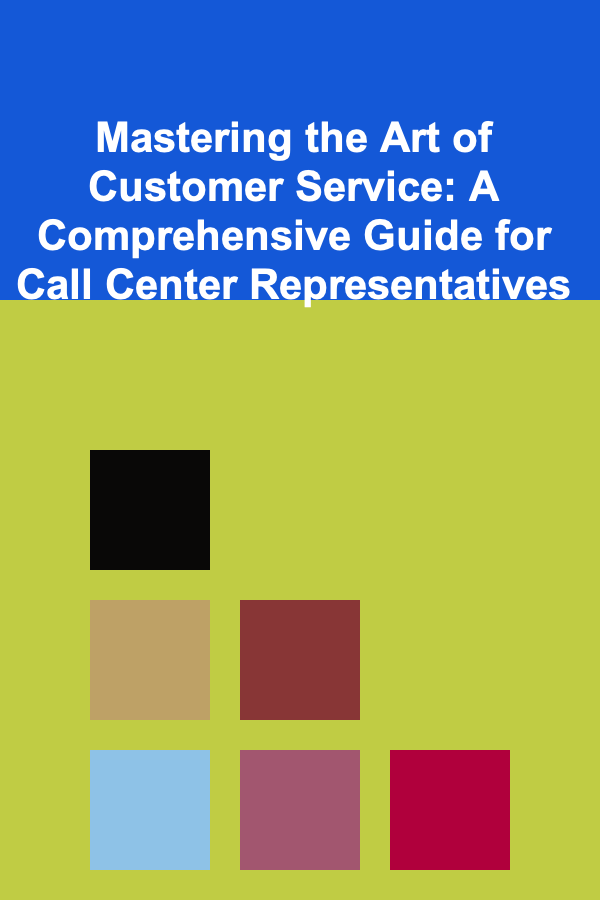
Mastering the Art of Customer Service: A Comprehensive Guide for Call Center Representatives
ebook include PDF & Audio bundle (Micro Guide)
$12.99$5.99
Limited Time Offer! Order within the next:

Customer service is a critical aspect of any business, especially in call centers where representatives are the direct point of contact for customers. As a call center representative, you play a key role in shaping the customer's experience with the company. Your ability to resolve issues, provide assistance, and create a positive interaction can make or break the company's reputation. Mastering the art of customer service is essential for both personal career growth and company success. This guide delves deep into actionable strategies to help you excel in your role, from building rapport to handling difficult situations with grace.
Understanding the Customer's Perspective
To be an effective call center representative, it's essential to put yourself in the customer's shoes. Understanding the customer's needs, emotions, and frustrations can go a long way in providing excellent service. Customers typically reach out because they need help or have a concern, so approaching each call with empathy and patience is critical.
The Importance of Empathy
Empathy allows you to connect with customers on a human level. When customers feel that their concerns are understood, they are more likely to be patient and cooperative. You must show that you care about their problem and that you're committed to finding a solution.
How to Cultivate Empathy:
- Listen Actively: Pay close attention to what the customer is saying, and avoid interrupting. This shows that you value their concerns and are invested in finding the best solution.
- Acknowledge Emotions: If a customer is frustrated or upset, acknowledge their feelings before attempting to resolve the issue. For example, saying something like, "I understand how frustrating this must be for you" can help to diffuse tension.
- Be Present: Stay focused on the conversation and avoid distractions. If you are multitasking or distracted, the customer may feel unimportant or neglected, leading to dissatisfaction.
By putting empathy into practice, you create a positive, customer-centric environment that encourages trust and cooperation.
Effective Communication Skills
Effective communication is the backbone of exceptional customer service. It's not just about speaking clearly but also about making sure your message is understood and that you understand the customer's message.
Key Components of Effective Communication:
- Active Listening: This is one of the most important skills in customer service. Active listening involves giving your full attention to the customer and confirming your understanding of their needs.
- Use phrases like: "Let me make sure I understand...", "I hear you, and I can help with that."
- Clear and Concise Language: Avoid jargon and complicated explanations. Be clear, simple, and to the point. A customer's frustration often arises from confusion, so aim to communicate in a way that is easily digestible.
- For example: If a customer asks how to reset their password, instead of saying, "You'll need to go into the settings and select the 'reset' option from the menu" , say "Click on the settings icon, then find and click 'Reset Password'".
- Tone and Body Language: Even though most call centers are over the phone, your tone of voice is a powerful tool. A warm, friendly tone reassures the customer that you're ready to help. If possible, stand or sit in a position that encourages a positive posture. Even over the phone, your body language can influence your tone.
- Key tip: Smile while talking! It can make your voice sound more approachable and friendly.
Mastering communication allows you to manage customer expectations and resolve their issues more effectively, creating a more satisfying experience for them.
Managing Difficult Situations with Confidence
Dealing with upset or irate customers is one of the most challenging aspects of working in a call center. However, handling these situations with professionalism and grace is what truly sets exceptional representatives apart from the rest.
Strategies for Handling Difficult Situations:
- Stay Calm and Composed: Never take things personally, no matter how the customer behaves. Remaining calm helps you think clearly and maintain control of the conversation.
- Key Tip: Take a deep breath before responding to an angry customer. This pause can help you manage your emotions and approach the situation rationally.
- Don't Take It Personally: Remember that the customer is upset about the situation, not about you. If they are rude or aggressive, don't internalize it.
- Use Positive Language: Try to frame your responses in a positive manner, even when delivering bad news. Instead of saying, "I can't do that," try saying, "Here's what I can do...".
- Apologize When Necessary: A sincere apology for the inconvenience or issue can go a long way in calming a frustrated customer, even if you aren't directly responsible for the problem. An apology shows that you understand their frustration and are working to make things right.
- Take Ownership: If the issue isn't immediately resolvable, assure the customer that you'll follow through or escalate the situation to the appropriate team. Customers appreciate representatives who take ownership of their concerns.
By confidently navigating difficult situations, you turn potentially negative experiences into opportunities to demonstrate your professionalism and commitment to customer satisfaction.
Problem-Solving and Solution-Oriented Thinking
In customer service, problem-solving is essential. Customers don't just want to be heard; they want their issues resolved. To become a top-tier representative, you must develop critical thinking and problem-solving skills.
Key Strategies for Effective Problem Solving:
- Clarify the Problem: Ask probing questions to get to the root of the issue. Often, the initial complaint is only a symptom of a bigger problem. By fully understanding the issue, you can provide a more effective solution.
- Example: "Can you walk me through the steps you took before encountering the problem?"
- Offer Solutions, Not Excuses: When faced with a problem, don't get bogged down by excuses or explanations of why things aren't working. Instead, focus on finding a solution.
- Example: If the customer is having trouble with an online service, instead of saying, "Our system is experiencing a glitch," offer, "Here's what I can do right now to get you back on track."
- Know When to Escalate: Sometimes, issues require more expertise than you can offer. Knowing when to escalate a problem to a supervisor or specialist ensures the customer's issue is handled correctly and promptly.
By developing strong problem-solving skills, you not only improve customer satisfaction but also increase your efficiency and effectiveness as a representative.
Time Management and Efficiency
In a fast-paced call center environment, managing time effectively is essential. Balancing quality customer service with productivity ensures that you meet your goals without sacrificing the customer experience.
Time Management Tips:
- Prioritize Tasks: Focus on the most pressing issues first. If a call involves a quick solution, resolve it as efficiently as possible and move on. For more complex issues, allocate more time and ensure all the customer's concerns are addressed.
- Use Call Scripts: Many call centers provide scripts or guidelines for common issues. Familiarizing yourself with these can help you address problems faster, giving you more time to focus on difficult cases.
- Avoid Multitasking: While it might seem efficient, multitasking can lead to errors and longer call times. Stick to one task at a time, ensuring you handle each case with care.
- Set Realistic Time Limits: While speed is important, avoid rushing through calls. Set personal time goals for how long each task should take, and strive to meet those targets without compromising service quality.
Mastering time management allows you to provide high-quality customer service without feeling overwhelmed or stressed.
Maintaining a Positive Attitude and Preventing Burnout
Working in a call center can be demanding, and maintaining a positive attitude is key to long-term success and job satisfaction. Preventing burnout and staying motivated will help you perform at your best every day.
Ways to Stay Positive and Avoid Burnout:
- Take Regular Breaks: Short breaks throughout the day give you time to recharge. This helps you stay focused and maintain high energy levels.
- Celebrate Small Wins: Recognize and celebrate small victories, such as resolving a difficult customer's issue or meeting your performance targets. This keeps you motivated and reinforces the value of your work.
- Stay Connected with Colleagues: The support of colleagues can be invaluable, especially on tough days. Share experiences, offer encouragement, and foster a team-oriented mindset.
- Practice Self-Care: Pay attention to your physical and mental well-being. Exercise, eat healthily, and engage in activities that help you relax and unwind.
A positive attitude and self-care are critical in ensuring that you remain engaged and productive, even when the work becomes challenging.
Conclusion
Mastering the art of customer service as a call center representative requires a combination of empathy, communication skills, problem-solving abilities, time management, and resilience. By developing these core competencies, you can create meaningful customer interactions that drive satisfaction and loyalty. Whether you're handling a routine inquiry or a complex issue, approaching each call with professionalism, empathy, and a solutions-oriented mindset will set you apart as an exceptional representative.
The journey to mastery in customer service is ongoing. Keep refining your skills, stay committed to learning, and always strive to exceed customer expectations. By doing so, you not only elevate your own career but also contribute to the success of your organization.

How to Make the Most of Dividend Investing for Steady Income
Read More
How to Make Use of Cork Boards for Important Reminders
Read More
One-Page Website Navigation: How to Create a Seamless User Journey
Read More
How to Make Flavored Vinegars
Read More
How to Identify Invasive Marine Species
Read More
Mastering Positive Self-Reinforcement: A Deep Dive
Read MoreOther Products

How to Make the Most of Dividend Investing for Steady Income
Read More
How to Make Use of Cork Boards for Important Reminders
Read More
One-Page Website Navigation: How to Create a Seamless User Journey
Read More
How to Make Flavored Vinegars
Read More
How to Identify Invasive Marine Species
Read More